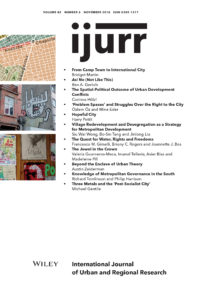In this article, we draw on the narratives of residents and development workers to understand what freedoms hinder and enable access to water services in informal settlements in the Indian cities of Faridabad, Delhi and Mumbai. We show that although development practice and thinking in the water sector often frame water deficiencies as politically neutral technical and governance challenges, residents and development workers on the ground identify a lack of freedoms relating to first of all, residents’ rights to the city and its resources, and secondly, meaningful engagement between residents and the political establishment as key causes for inadequate access to water services. Our findings indicate that water‐service development efforts can be more effective if they include strategies to strengthen informal settlers’ rights to the city through a politicization of public engagement. We discuss the implications of our findings for practice and outline a future research agenda geared towards operationalizing our key findings.
Details
Written by:
Francesco M. Gimelli, Briony C. Rogers & Joannette J. Bos
Digital Object Identifier (DOI)
10.1111/1468-2427.12708
About DOI

